Relative Study: Medication, Alternative Treatments for Depression
VerifiedAdded on 2023/06/05
|13
|4203
|67
Report
AI Summary
This report provides a comprehensive overview of various treatment methods for depression, comparing the effectiveness of conventional pharmacological approaches with alternative therapies. It begins with an abstract and introduction that defines depression as a mood disorder characterized by persistent sadness and loss of interest, impacting daily functioning. A detailed literature review examines the efficacy of antidepressants, particularly SSRIs, and explores alternative treatments like cognitive behavioral therapy, lifestyle modifications, and herbal remedies such as St. John's wort, ginseng, and lavender. The rationale of the study emphasizes the importance of understanding both conventional and alternative treatments for depression. The research methodology is based on secondary data analysis, utilizing qualitative research to explore existing data from sources such as PubMed and ResearchGate. The report analyzes the mechanisms of action of antidepressants and highlights the benefits of complementary therapies, including the placebo effect. The discussion section synthesizes the findings from the literature review, and the recommendations and conclusion offer suggestions for effective treatment strategies. Overall, the report aims to provide a comparative analysis of depression treatments, offering insights into the complexities of managing mood disorders.
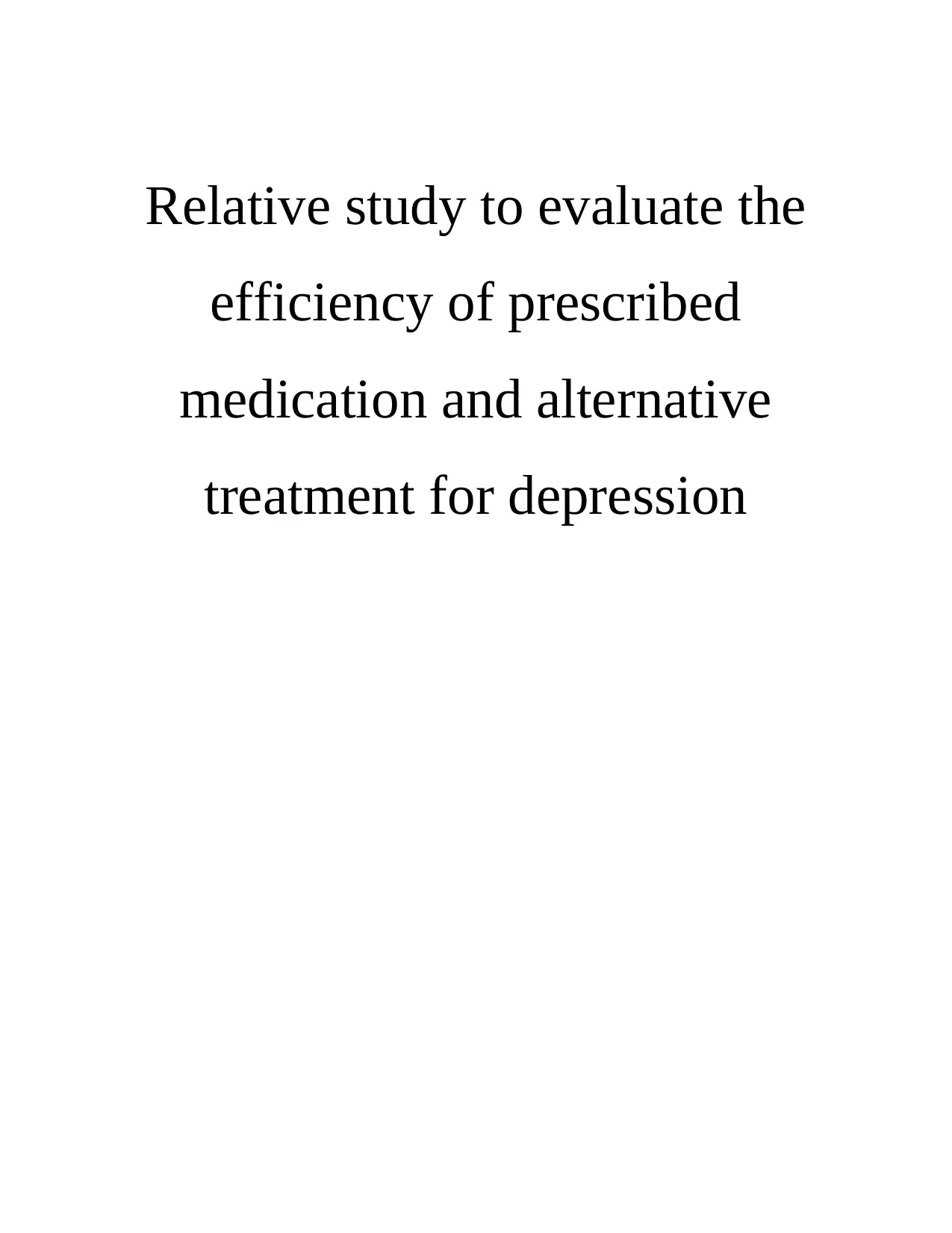
Relative study to evaluate the
efficiency of prescribed
medication and alternative
treatment for depression
efficiency of prescribed
medication and alternative
treatment for depression
Paraphrase This Document
Need a fresh take? Get an instant paraphrase of this document with our AI Paraphraser
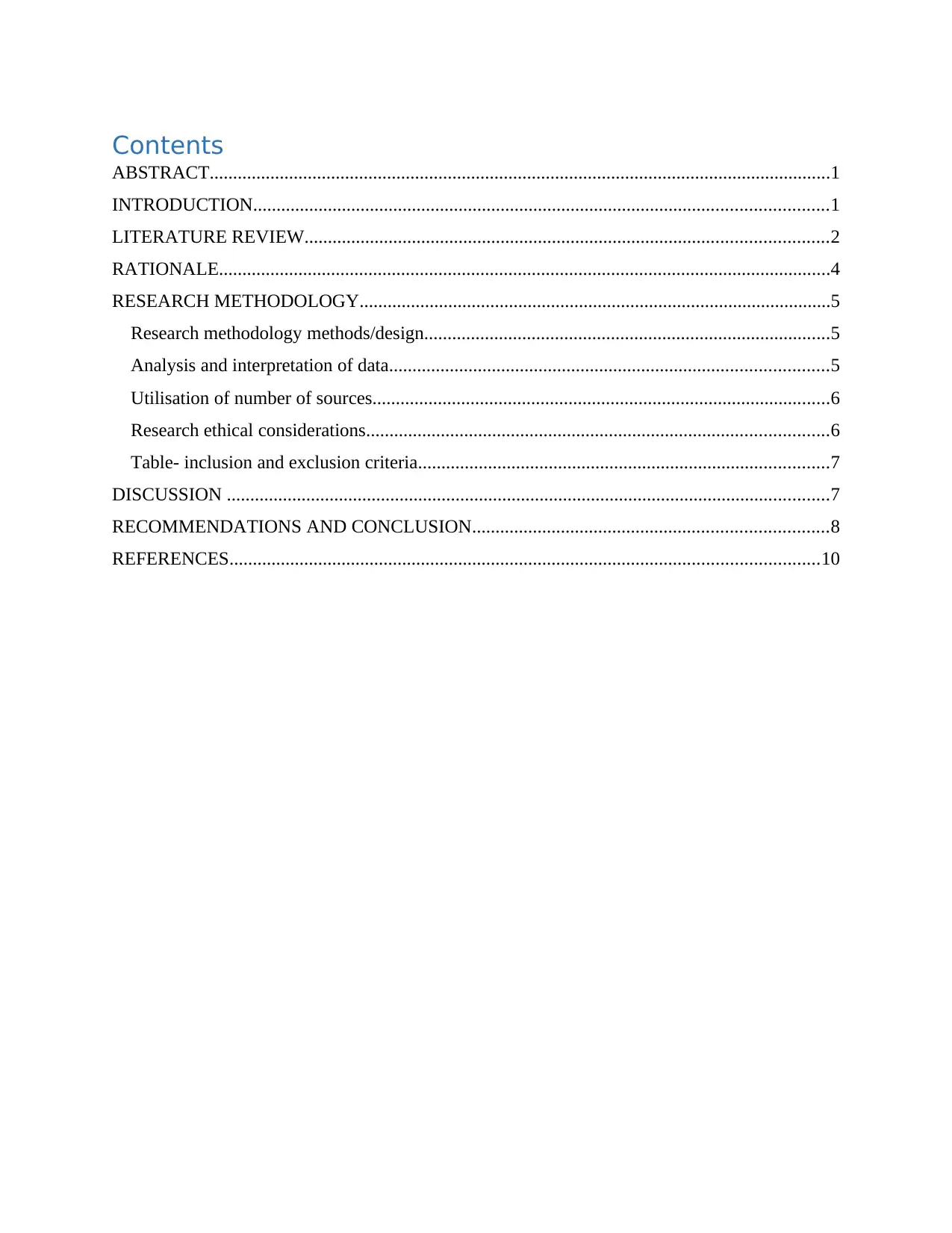
Contents
ABSTRACT.....................................................................................................................................1
INTRODUCTION...........................................................................................................................1
LITERATURE REVIEW................................................................................................................2
RATIONALE...................................................................................................................................4
RESEARCH METHODOLOGY.....................................................................................................5
Research methodology methods/design.......................................................................................5
Analysis and interpretation of data..............................................................................................5
Utilisation of number of sources..................................................................................................6
Research ethical considerations...................................................................................................6
Table- inclusion and exclusion criteria........................................................................................7
DISCUSSION .................................................................................................................................7
RECOMMENDATIONS AND CONCLUSION............................................................................8
REFERENCES..............................................................................................................................10
ABSTRACT.....................................................................................................................................1
INTRODUCTION...........................................................................................................................1
LITERATURE REVIEW................................................................................................................2
RATIONALE...................................................................................................................................4
RESEARCH METHODOLOGY.....................................................................................................5
Research methodology methods/design.......................................................................................5
Analysis and interpretation of data..............................................................................................5
Utilisation of number of sources..................................................................................................6
Research ethical considerations...................................................................................................6
Table- inclusion and exclusion criteria........................................................................................7
DISCUSSION .................................................................................................................................7
RECOMMENDATIONS AND CONCLUSION............................................................................8
REFERENCES..............................................................................................................................10

ABSTRACT
Depression is a characterized by a group of symptoms which cause elevation or
worsening of a person's mood. Depression is commonly termed as a mood disorder which causes
continuous feeling of low mood and sadness along with loss of interest. This condition interferes
with daily activities of a person leading to development of a serious medical illness. There is
pharmacological treatment available for mild, moderate and severe depression. However, there
are a variety of treatment methods available for depression which are not related to
pharmacological treatments.
INTRODUCTION
Depression is characterized by persistent sadness and loss of appetite, affecting everyday
functioning of life. Symptoms of depression involves loss of interest in activities and feelings of
worthlessness. A person with depression becomes easily agitated and triggered by a mix of
genetic, psychological and environmental factors (Shienko, 2021). Depression is basically a
mood disorder interfering with everyday activities of a person. Treatment for depression consists
of a combination of self-help, talk-therapy and medications. The most common pharmacological
treatment of depression includes prescription of Selective serotonin reuptake inhibitors (SSRIs).
These medications are administered due to tolerable side effects and increased efficacy.
Alternative treatment of depression includes cognitive behavioural therapy and lifestyle
modifications. Antidepressants are an additional part of treatment of depression along with
psychotherapy (Konstantinou and et. al., 2020). Antidepressants are also called as mood
stabilizers and aids in prevention of restlessness, anxiety and suicidal thoughts. These
medications aim at relieving the severity of symptoms and prevent depression from coming back.
Additional treatment methods for treatment of depression include regular exercise, balanced diet
and spending time away from technology. This dissertation research project aims at exploring
effective and alternative treatment for depression. The research project will also include
discussion about conventional medicinal products that are effective in treatment of depression.
The effectiveness of depression treatment with pharmaceutical medicinal products is also
assessed in this dissertation. This thesis also highlights a comparative analysis of efficacy of
alternative treatment and pharmaceutical medication in the treatment of depression and
recommendation for effective treatment of depression.
1
Depression is a characterized by a group of symptoms which cause elevation or
worsening of a person's mood. Depression is commonly termed as a mood disorder which causes
continuous feeling of low mood and sadness along with loss of interest. This condition interferes
with daily activities of a person leading to development of a serious medical illness. There is
pharmacological treatment available for mild, moderate and severe depression. However, there
are a variety of treatment methods available for depression which are not related to
pharmacological treatments.
INTRODUCTION
Depression is characterized by persistent sadness and loss of appetite, affecting everyday
functioning of life. Symptoms of depression involves loss of interest in activities and feelings of
worthlessness. A person with depression becomes easily agitated and triggered by a mix of
genetic, psychological and environmental factors (Shienko, 2021). Depression is basically a
mood disorder interfering with everyday activities of a person. Treatment for depression consists
of a combination of self-help, talk-therapy and medications. The most common pharmacological
treatment of depression includes prescription of Selective serotonin reuptake inhibitors (SSRIs).
These medications are administered due to tolerable side effects and increased efficacy.
Alternative treatment of depression includes cognitive behavioural therapy and lifestyle
modifications. Antidepressants are an additional part of treatment of depression along with
psychotherapy (Konstantinou and et. al., 2020). Antidepressants are also called as mood
stabilizers and aids in prevention of restlessness, anxiety and suicidal thoughts. These
medications aim at relieving the severity of symptoms and prevent depression from coming back.
Additional treatment methods for treatment of depression include regular exercise, balanced diet
and spending time away from technology. This dissertation research project aims at exploring
effective and alternative treatment for depression. The research project will also include
discussion about conventional medicinal products that are effective in treatment of depression.
The effectiveness of depression treatment with pharmaceutical medicinal products is also
assessed in this dissertation. This thesis also highlights a comparative analysis of efficacy of
alternative treatment and pharmaceutical medication in the treatment of depression and
recommendation for effective treatment of depression.
1
⊘ This is a preview!⊘
Do you want full access?
Subscribe today to unlock all pages.

Trusted by 1+ million students worldwide
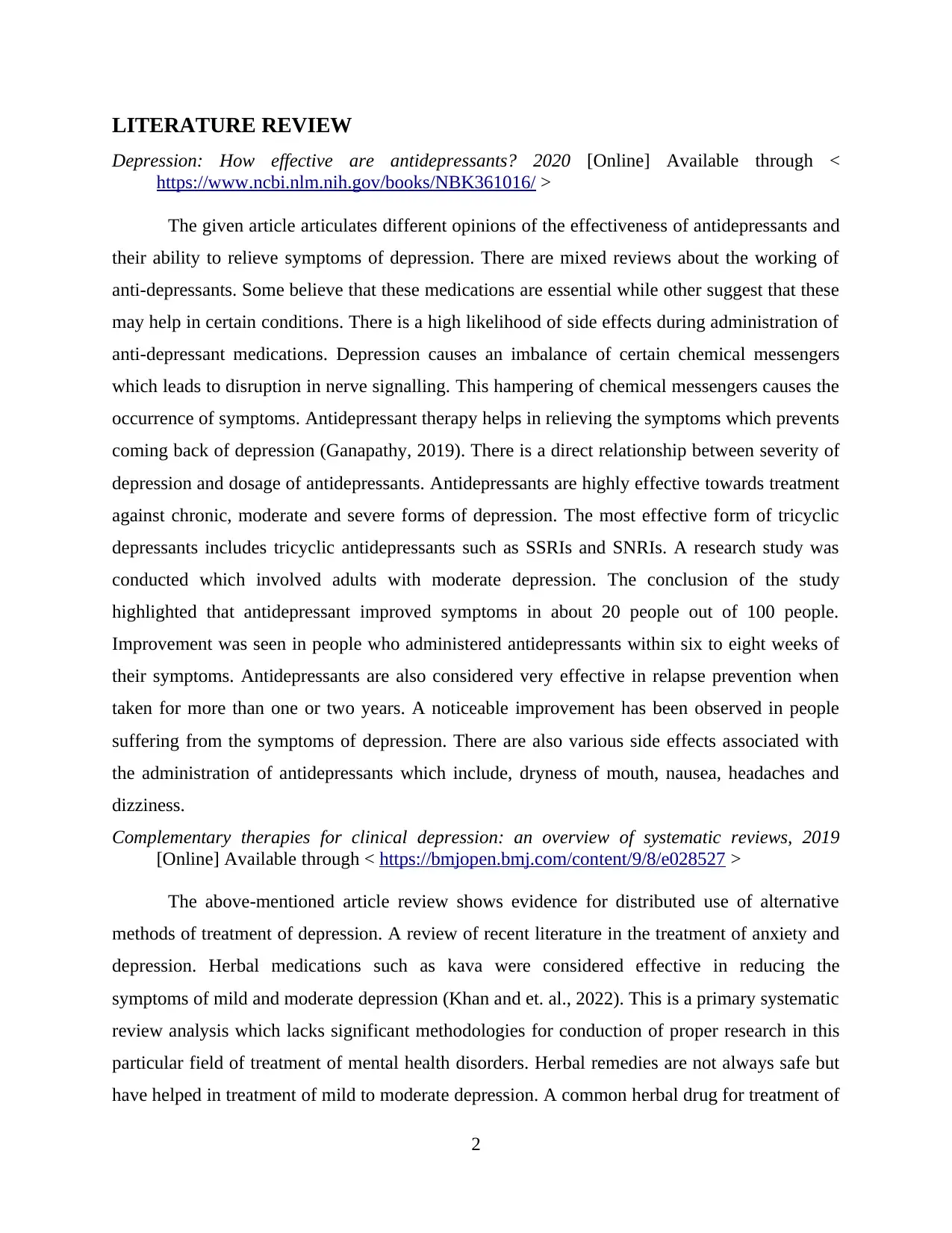
LITERATURE REVIEW
Depression: How effective are antidepressants? 2020 [Online] Available through <
https://www.ncbi.nlm.nih.gov/books/NBK361016/ >
The given article articulates different opinions of the effectiveness of antidepressants and
their ability to relieve symptoms of depression. There are mixed reviews about the working of
anti-depressants. Some believe that these medications are essential while other suggest that these
may help in certain conditions. There is a high likelihood of side effects during administration of
anti-depressant medications. Depression causes an imbalance of certain chemical messengers
which leads to disruption in nerve signalling. This hampering of chemical messengers causes the
occurrence of symptoms. Antidepressant therapy helps in relieving the symptoms which prevents
coming back of depression (Ganapathy, 2019). There is a direct relationship between severity of
depression and dosage of antidepressants. Antidepressants are highly effective towards treatment
against chronic, moderate and severe forms of depression. The most effective form of tricyclic
depressants includes tricyclic antidepressants such as SSRIs and SNRIs. A research study was
conducted which involved adults with moderate depression. The conclusion of the study
highlighted that antidepressant improved symptoms in about 20 people out of 100 people.
Improvement was seen in people who administered antidepressants within six to eight weeks of
their symptoms. Antidepressants are also considered very effective in relapse prevention when
taken for more than one or two years. A noticeable improvement has been observed in people
suffering from the symptoms of depression. There are also various side effects associated with
the administration of antidepressants which include, dryness of mouth, nausea, headaches and
dizziness.
Complementary therapies for clinical depression: an overview of systematic reviews, 2019
[Online] Available through < https://bmjopen.bmj.com/content/9/8/e028527 >
The above-mentioned article review shows evidence for distributed use of alternative
methods of treatment of depression. A review of recent literature in the treatment of anxiety and
depression. Herbal medications such as kava were considered effective in reducing the
symptoms of mild and moderate depression (Khan and et. al., 2022). This is a primary systematic
review analysis which lacks significant methodologies for conduction of proper research in this
particular field of treatment of mental health disorders. Herbal remedies are not always safe but
have helped in treatment of mild to moderate depression. A common herbal drug for treatment of
2
Depression: How effective are antidepressants? 2020 [Online] Available through <
https://www.ncbi.nlm.nih.gov/books/NBK361016/ >
The given article articulates different opinions of the effectiveness of antidepressants and
their ability to relieve symptoms of depression. There are mixed reviews about the working of
anti-depressants. Some believe that these medications are essential while other suggest that these
may help in certain conditions. There is a high likelihood of side effects during administration of
anti-depressant medications. Depression causes an imbalance of certain chemical messengers
which leads to disruption in nerve signalling. This hampering of chemical messengers causes the
occurrence of symptoms. Antidepressant therapy helps in relieving the symptoms which prevents
coming back of depression (Ganapathy, 2019). There is a direct relationship between severity of
depression and dosage of antidepressants. Antidepressants are highly effective towards treatment
against chronic, moderate and severe forms of depression. The most effective form of tricyclic
depressants includes tricyclic antidepressants such as SSRIs and SNRIs. A research study was
conducted which involved adults with moderate depression. The conclusion of the study
highlighted that antidepressant improved symptoms in about 20 people out of 100 people.
Improvement was seen in people who administered antidepressants within six to eight weeks of
their symptoms. Antidepressants are also considered very effective in relapse prevention when
taken for more than one or two years. A noticeable improvement has been observed in people
suffering from the symptoms of depression. There are also various side effects associated with
the administration of antidepressants which include, dryness of mouth, nausea, headaches and
dizziness.
Complementary therapies for clinical depression: an overview of systematic reviews, 2019
[Online] Available through < https://bmjopen.bmj.com/content/9/8/e028527 >
The above-mentioned article review shows evidence for distributed use of alternative
methods of treatment of depression. A review of recent literature in the treatment of anxiety and
depression. Herbal medications such as kava were considered effective in reducing the
symptoms of mild and moderate depression (Khan and et. al., 2022). This is a primary systematic
review analysis which lacks significant methodologies for conduction of proper research in this
particular field of treatment of mental health disorders. Herbal remedies are not always safe but
have helped in treatment of mild to moderate depression. A common herbal drug for treatment of
2
Paraphrase This Document
Need a fresh take? Get an instant paraphrase of this document with our AI Paraphraser

mental health disorders, especially depression is hypericum perforatum. This medication was
considered more effective than a potential placebo. Other herbal agents such as ginseng,
chamomile and lavender flowers are known to manage symptoms of depression and anxiety.
There is enough evidence which depicts that chamomile has various advantages in treatment of
depressive episodes along with several other health benefits. Similarly, lavender is considered an
effective herb for ongoing depression. This statement is well supported with high quality of
evidence. Research based evidence consider saffron an effective measure for management of
depression symptoms. Evidence suggests that mindfulness based cognitive therapy was helpful
in preventing relapse of depression and is comparatively effective compared to St. John's wort as
the latter caused severe adverse effects upon administration (Altın, 2018).
Alternative Treatments for Depression, 2020 [Online] Available through <
https://bmcmedicine.biomedcentral.com/articles/10.1186/s12916-020-01623-9 >
The above presented research article lays emphasis on effectiveness of treatment that are
employed in major depressive disorders or depression. The prevalence of depression around the
globe is huge and it is crucial to develop treatment methods that are beneficial to all vulnerable
groups. Non-drug approaches to depression include natural remedies and home treatments for
treating mild to moderate depression (Dotson and et. al., 2021). Alternative or complementary
therapy refers to a health treatment which consists of lifestyle modifications or exercising.
Alternative therapy does not include standardized western medical practice or pharmacological
approaches to treat a patient. Alternative therapy treatment measures can include administration
of herbal supplements such as St. John's wort, which seems to work for mild to moderate
depression. Other forms of alternative therapy include meditation and yoga which is commonly
referred for improving overall mood of a person. Yoga involves specific body poses and certain
breathing techniques which helps in relaxing the body and helps improve symptoms of
depression. Physical exercises have proven to lower stress and symptoms of depression.
Consistency of physical exercise helps in improving balance and flexibility leading to betterment
of overall health. Other techniques for relieving mood disorders include guided imagery and
music therapy as these techniques help in building positive images in minds of patients to help
them ease their conditions (Shults, 2018). The latter is considered a natural tranquillizer for
humans, matching the personal needs and desires of human moods.
3
considered more effective than a potential placebo. Other herbal agents such as ginseng,
chamomile and lavender flowers are known to manage symptoms of depression and anxiety.
There is enough evidence which depicts that chamomile has various advantages in treatment of
depressive episodes along with several other health benefits. Similarly, lavender is considered an
effective herb for ongoing depression. This statement is well supported with high quality of
evidence. Research based evidence consider saffron an effective measure for management of
depression symptoms. Evidence suggests that mindfulness based cognitive therapy was helpful
in preventing relapse of depression and is comparatively effective compared to St. John's wort as
the latter caused severe adverse effects upon administration (Altın, 2018).
Alternative Treatments for Depression, 2020 [Online] Available through <
https://bmcmedicine.biomedcentral.com/articles/10.1186/s12916-020-01623-9 >
The above presented research article lays emphasis on effectiveness of treatment that are
employed in major depressive disorders or depression. The prevalence of depression around the
globe is huge and it is crucial to develop treatment methods that are beneficial to all vulnerable
groups. Non-drug approaches to depression include natural remedies and home treatments for
treating mild to moderate depression (Dotson and et. al., 2021). Alternative or complementary
therapy refers to a health treatment which consists of lifestyle modifications or exercising.
Alternative therapy does not include standardized western medical practice or pharmacological
approaches to treat a patient. Alternative therapy treatment measures can include administration
of herbal supplements such as St. John's wort, which seems to work for mild to moderate
depression. Other forms of alternative therapy include meditation and yoga which is commonly
referred for improving overall mood of a person. Yoga involves specific body poses and certain
breathing techniques which helps in relaxing the body and helps improve symptoms of
depression. Physical exercises have proven to lower stress and symptoms of depression.
Consistency of physical exercise helps in improving balance and flexibility leading to betterment
of overall health. Other techniques for relieving mood disorders include guided imagery and
music therapy as these techniques help in building positive images in minds of patients to help
them ease their conditions (Shults, 2018). The latter is considered a natural tranquillizer for
humans, matching the personal needs and desires of human moods.
3
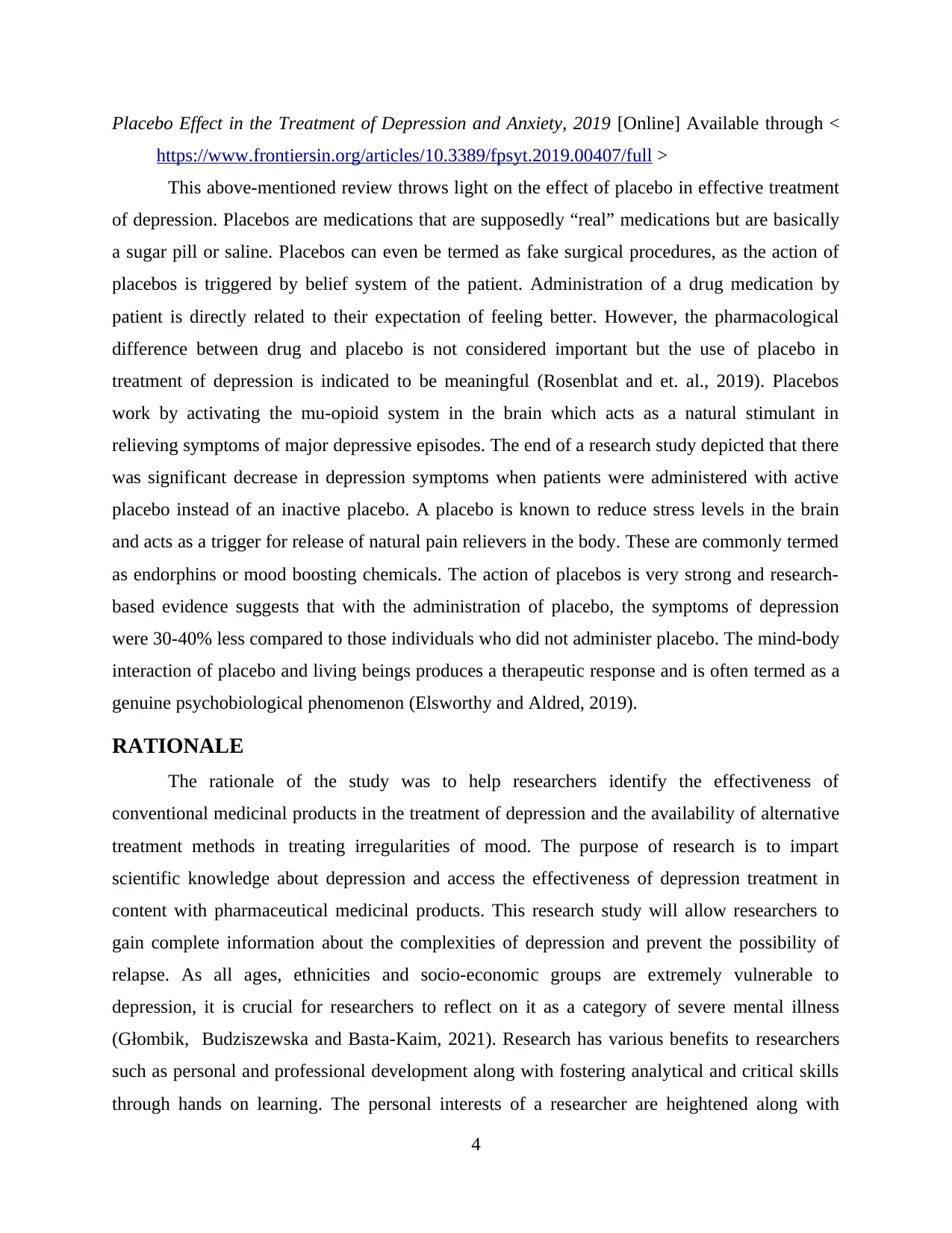
Placebo Effect in the Treatment of Depression and Anxiety, 2019 [Online] Available through <
https://www.frontiersin.org/articles/10.3389/fpsyt.2019.00407/full >
This above-mentioned review throws light on the effect of placebo in effective treatment
of depression. Placebos are medications that are supposedly “real” medications but are basically
a sugar pill or saline. Placebos can even be termed as fake surgical procedures, as the action of
placebos is triggered by belief system of the patient. Administration of a drug medication by
patient is directly related to their expectation of feeling better. However, the pharmacological
difference between drug and placebo is not considered important but the use of placebo in
treatment of depression is indicated to be meaningful (Rosenblat and et. al., 2019). Placebos
work by activating the mu-opioid system in the brain which acts as a natural stimulant in
relieving symptoms of major depressive episodes. The end of a research study depicted that there
was significant decrease in depression symptoms when patients were administered with active
placebo instead of an inactive placebo. A placebo is known to reduce stress levels in the brain
and acts as a trigger for release of natural pain relievers in the body. These are commonly termed
as endorphins or mood boosting chemicals. The action of placebos is very strong and research-
based evidence suggests that with the administration of placebo, the symptoms of depression
were 30-40% less compared to those individuals who did not administer placebo. The mind-body
interaction of placebo and living beings produces a therapeutic response and is often termed as a
genuine psychobiological phenomenon (Elsworthy and Aldred, 2019).
RATIONALE
The rationale of the study was to help researchers identify the effectiveness of
conventional medicinal products in the treatment of depression and the availability of alternative
treatment methods in treating irregularities of mood. The purpose of research is to impart
scientific knowledge about depression and access the effectiveness of depression treatment in
content with pharmaceutical medicinal products. This research study will allow researchers to
gain complete information about the complexities of depression and prevent the possibility of
relapse. As all ages, ethnicities and socio-economic groups are extremely vulnerable to
depression, it is crucial for researchers to reflect on it as a category of severe mental illness
(Głombik, Budziszewska and Basta-Kaim, 2021). Research has various benefits to researchers
such as personal and professional development along with fostering analytical and critical skills
through hands on learning. The personal interests of a researcher are heightened along with
4
https://www.frontiersin.org/articles/10.3389/fpsyt.2019.00407/full >
This above-mentioned review throws light on the effect of placebo in effective treatment
of depression. Placebos are medications that are supposedly “real” medications but are basically
a sugar pill or saline. Placebos can even be termed as fake surgical procedures, as the action of
placebos is triggered by belief system of the patient. Administration of a drug medication by
patient is directly related to their expectation of feeling better. However, the pharmacological
difference between drug and placebo is not considered important but the use of placebo in
treatment of depression is indicated to be meaningful (Rosenblat and et. al., 2019). Placebos
work by activating the mu-opioid system in the brain which acts as a natural stimulant in
relieving symptoms of major depressive episodes. The end of a research study depicted that there
was significant decrease in depression symptoms when patients were administered with active
placebo instead of an inactive placebo. A placebo is known to reduce stress levels in the brain
and acts as a trigger for release of natural pain relievers in the body. These are commonly termed
as endorphins or mood boosting chemicals. The action of placebos is very strong and research-
based evidence suggests that with the administration of placebo, the symptoms of depression
were 30-40% less compared to those individuals who did not administer placebo. The mind-body
interaction of placebo and living beings produces a therapeutic response and is often termed as a
genuine psychobiological phenomenon (Elsworthy and Aldred, 2019).
RATIONALE
The rationale of the study was to help researchers identify the effectiveness of
conventional medicinal products in the treatment of depression and the availability of alternative
treatment methods in treating irregularities of mood. The purpose of research is to impart
scientific knowledge about depression and access the effectiveness of depression treatment in
content with pharmaceutical medicinal products. This research study will allow researchers to
gain complete information about the complexities of depression and prevent the possibility of
relapse. As all ages, ethnicities and socio-economic groups are extremely vulnerable to
depression, it is crucial for researchers to reflect on it as a category of severe mental illness
(Głombik, Budziszewska and Basta-Kaim, 2021). Research has various benefits to researchers
such as personal and professional development along with fostering analytical and critical skills
through hands on learning. The personal interests of a researcher are heightened along with
4
⊘ This is a preview!⊘
Do you want full access?
Subscribe today to unlock all pages.

Trusted by 1+ million students worldwide
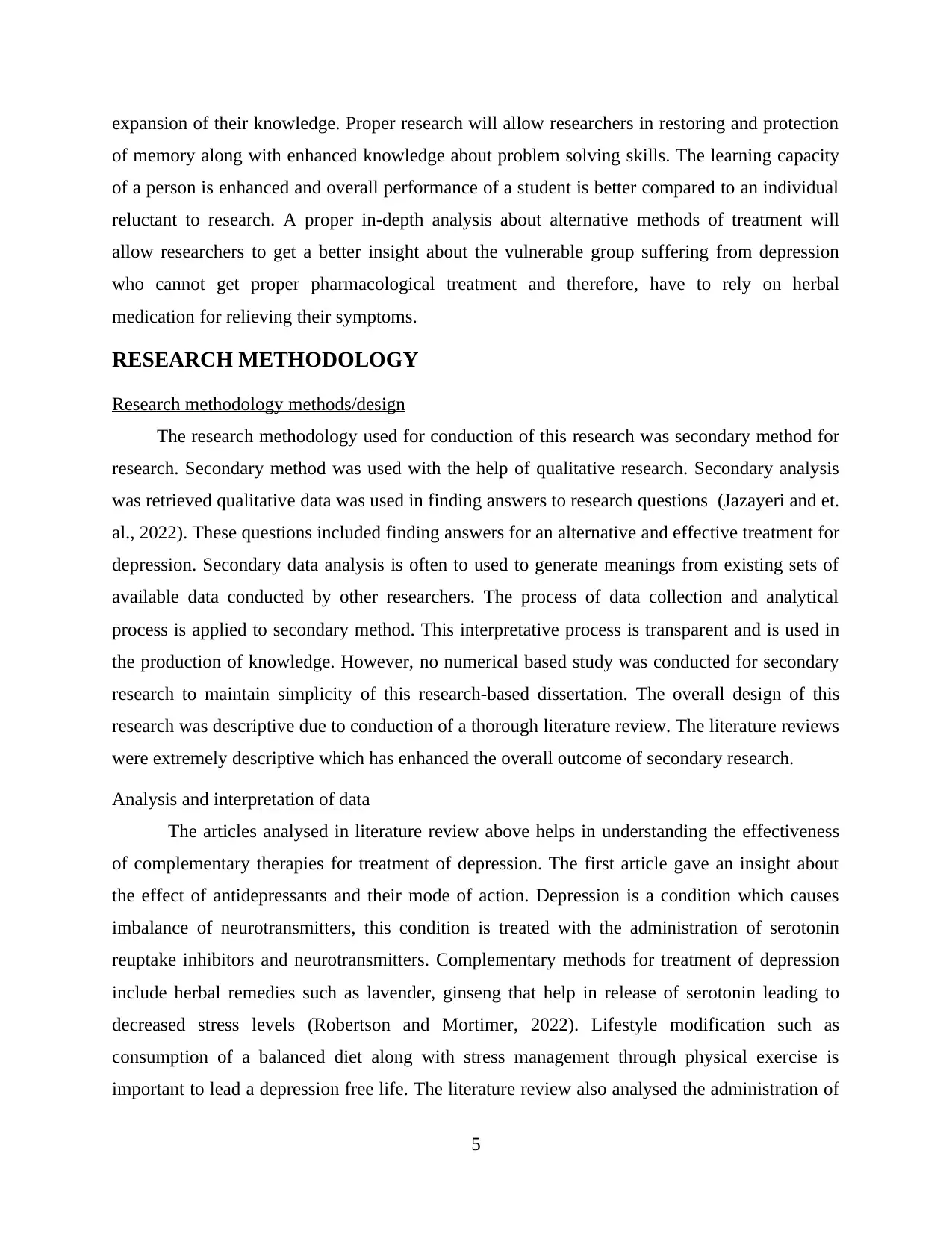
expansion of their knowledge. Proper research will allow researchers in restoring and protection
of memory along with enhanced knowledge about problem solving skills. The learning capacity
of a person is enhanced and overall performance of a student is better compared to an individual
reluctant to research. A proper in-depth analysis about alternative methods of treatment will
allow researchers to get a better insight about the vulnerable group suffering from depression
who cannot get proper pharmacological treatment and therefore, have to rely on herbal
medication for relieving their symptoms.
RESEARCH METHODOLOGY
Research methodology methods/design
The research methodology used for conduction of this research was secondary method for
research. Secondary method was used with the help of qualitative research. Secondary analysis
was retrieved qualitative data was used in finding answers to research questions (Jazayeri and et.
al., 2022). These questions included finding answers for an alternative and effective treatment for
depression. Secondary data analysis is often to used to generate meanings from existing sets of
available data conducted by other researchers. The process of data collection and analytical
process is applied to secondary method. This interpretative process is transparent and is used in
the production of knowledge. However, no numerical based study was conducted for secondary
research to maintain simplicity of this research-based dissertation. The overall design of this
research was descriptive due to conduction of a thorough literature review. The literature reviews
were extremely descriptive which has enhanced the overall outcome of secondary research.
Analysis and interpretation of data
The articles analysed in literature review above helps in understanding the effectiveness
of complementary therapies for treatment of depression. The first article gave an insight about
the effect of antidepressants and their mode of action. Depression is a condition which causes
imbalance of neurotransmitters, this condition is treated with the administration of serotonin
reuptake inhibitors and neurotransmitters. Complementary methods for treatment of depression
include herbal remedies such as lavender, ginseng that help in release of serotonin leading to
decreased stress levels (Robertson and Mortimer, 2022). Lifestyle modification such as
consumption of a balanced diet along with stress management through physical exercise is
important to lead a depression free life. The literature review also analysed the administration of
5
of memory along with enhanced knowledge about problem solving skills. The learning capacity
of a person is enhanced and overall performance of a student is better compared to an individual
reluctant to research. A proper in-depth analysis about alternative methods of treatment will
allow researchers to get a better insight about the vulnerable group suffering from depression
who cannot get proper pharmacological treatment and therefore, have to rely on herbal
medication for relieving their symptoms.
RESEARCH METHODOLOGY
Research methodology methods/design
The research methodology used for conduction of this research was secondary method for
research. Secondary method was used with the help of qualitative research. Secondary analysis
was retrieved qualitative data was used in finding answers to research questions (Jazayeri and et.
al., 2022). These questions included finding answers for an alternative and effective treatment for
depression. Secondary data analysis is often to used to generate meanings from existing sets of
available data conducted by other researchers. The process of data collection and analytical
process is applied to secondary method. This interpretative process is transparent and is used in
the production of knowledge. However, no numerical based study was conducted for secondary
research to maintain simplicity of this research-based dissertation. The overall design of this
research was descriptive due to conduction of a thorough literature review. The literature reviews
were extremely descriptive which has enhanced the overall outcome of secondary research.
Analysis and interpretation of data
The articles analysed in literature review above helps in understanding the effectiveness
of complementary therapies for treatment of depression. The first article gave an insight about
the effect of antidepressants and their mode of action. Depression is a condition which causes
imbalance of neurotransmitters, this condition is treated with the administration of serotonin
reuptake inhibitors and neurotransmitters. Complementary methods for treatment of depression
include herbal remedies such as lavender, ginseng that help in release of serotonin leading to
decreased stress levels (Robertson and Mortimer, 2022). Lifestyle modification such as
consumption of a balanced diet along with stress management through physical exercise is
important to lead a depression free life. The literature review also analysed the administration of
5
Paraphrase This Document
Need a fresh take? Get an instant paraphrase of this document with our AI Paraphraser
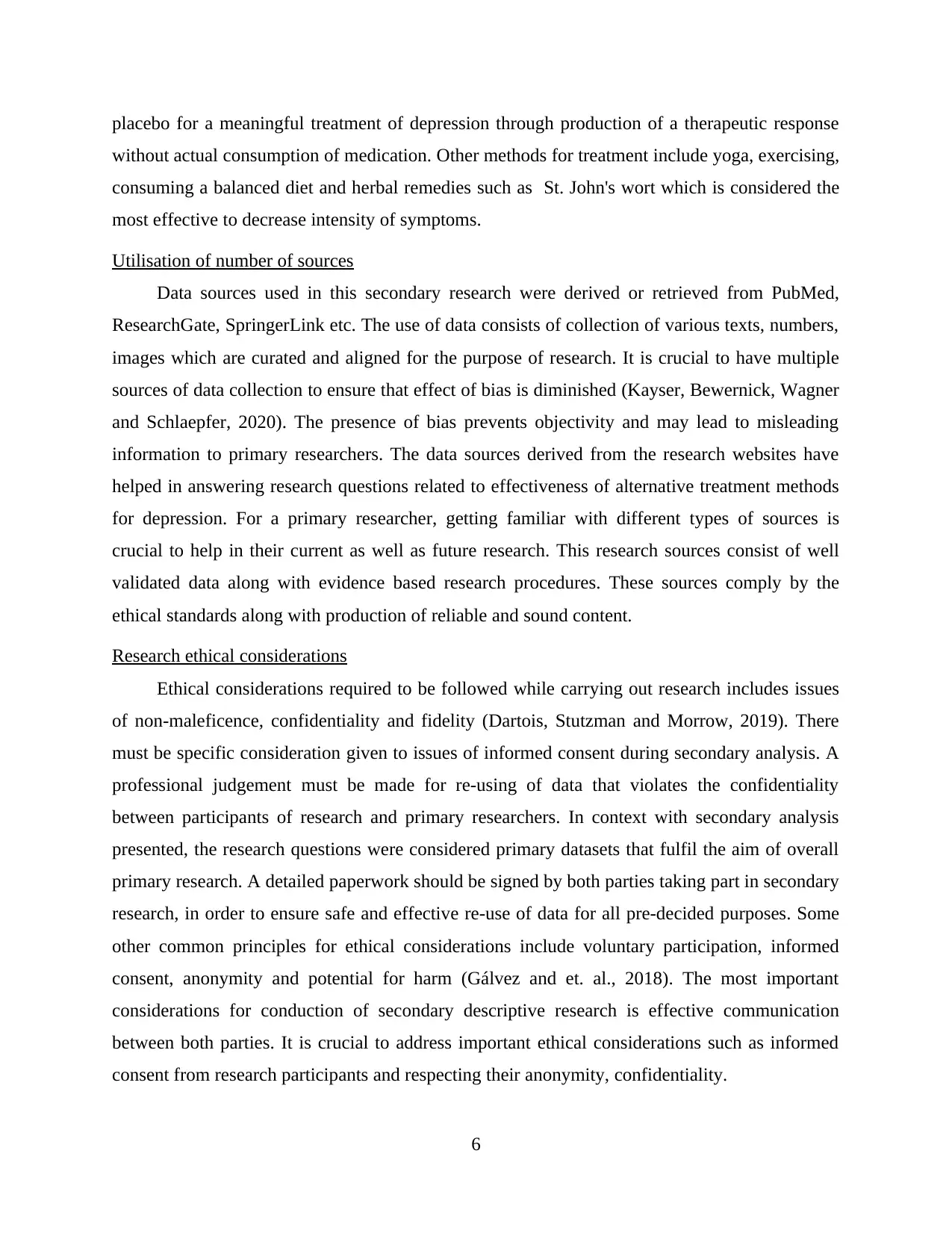
placebo for a meaningful treatment of depression through production of a therapeutic response
without actual consumption of medication. Other methods for treatment include yoga, exercising,
consuming a balanced diet and herbal remedies such as St. John's wort which is considered the
most effective to decrease intensity of symptoms.
Utilisation of number of sources
Data sources used in this secondary research were derived or retrieved from PubMed,
ResearchGate, SpringerLink etc. The use of data consists of collection of various texts, numbers,
images which are curated and aligned for the purpose of research. It is crucial to have multiple
sources of data collection to ensure that effect of bias is diminished (Kayser, Bewernick, Wagner
and Schlaepfer, 2020). The presence of bias prevents objectivity and may lead to misleading
information to primary researchers. The data sources derived from the research websites have
helped in answering research questions related to effectiveness of alternative treatment methods
for depression. For a primary researcher, getting familiar with different types of sources is
crucial to help in their current as well as future research. This research sources consist of well
validated data along with evidence based research procedures. These sources comply by the
ethical standards along with production of reliable and sound content.
Research ethical considerations
Ethical considerations required to be followed while carrying out research includes issues
of non-maleficence, confidentiality and fidelity (Dartois, Stutzman and Morrow, 2019). There
must be specific consideration given to issues of informed consent during secondary analysis. A
professional judgement must be made for re-using of data that violates the confidentiality
between participants of research and primary researchers. In context with secondary analysis
presented, the research questions were considered primary datasets that fulfil the aim of overall
primary research. A detailed paperwork should be signed by both parties taking part in secondary
research, in order to ensure safe and effective re-use of data for all pre-decided purposes. Some
other common principles for ethical considerations include voluntary participation, informed
consent, anonymity and potential for harm (Gálvez and et. al., 2018). The most important
considerations for conduction of secondary descriptive research is effective communication
between both parties. It is crucial to address important ethical considerations such as informed
consent from research participants and respecting their anonymity, confidentiality.
6
without actual consumption of medication. Other methods for treatment include yoga, exercising,
consuming a balanced diet and herbal remedies such as St. John's wort which is considered the
most effective to decrease intensity of symptoms.
Utilisation of number of sources
Data sources used in this secondary research were derived or retrieved from PubMed,
ResearchGate, SpringerLink etc. The use of data consists of collection of various texts, numbers,
images which are curated and aligned for the purpose of research. It is crucial to have multiple
sources of data collection to ensure that effect of bias is diminished (Kayser, Bewernick, Wagner
and Schlaepfer, 2020). The presence of bias prevents objectivity and may lead to misleading
information to primary researchers. The data sources derived from the research websites have
helped in answering research questions related to effectiveness of alternative treatment methods
for depression. For a primary researcher, getting familiar with different types of sources is
crucial to help in their current as well as future research. This research sources consist of well
validated data along with evidence based research procedures. These sources comply by the
ethical standards along with production of reliable and sound content.
Research ethical considerations
Ethical considerations required to be followed while carrying out research includes issues
of non-maleficence, confidentiality and fidelity (Dartois, Stutzman and Morrow, 2019). There
must be specific consideration given to issues of informed consent during secondary analysis. A
professional judgement must be made for re-using of data that violates the confidentiality
between participants of research and primary researchers. In context with secondary analysis
presented, the research questions were considered primary datasets that fulfil the aim of overall
primary research. A detailed paperwork should be signed by both parties taking part in secondary
research, in order to ensure safe and effective re-use of data for all pre-decided purposes. Some
other common principles for ethical considerations include voluntary participation, informed
consent, anonymity and potential for harm (Gálvez and et. al., 2018). The most important
considerations for conduction of secondary descriptive research is effective communication
between both parties. It is crucial to address important ethical considerations such as informed
consent from research participants and respecting their anonymity, confidentiality.
6
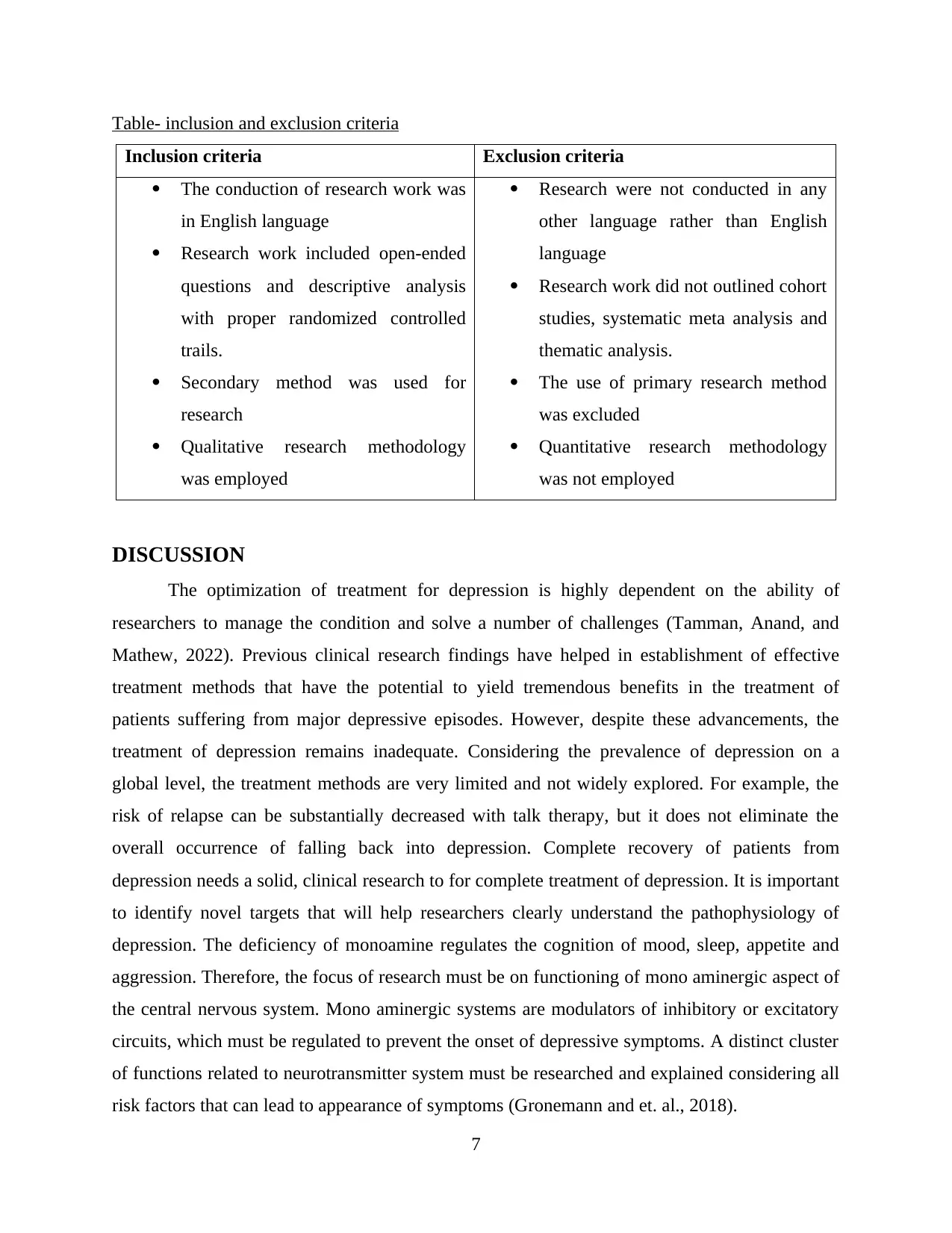
Table- inclusion and exclusion criteria
Inclusion criteria Exclusion criteria
The conduction of research work was
in English language
Research work included open-ended
questions and descriptive analysis
with proper randomized controlled
trails.
Secondary method was used for
research
Qualitative research methodology
was employed
Research were not conducted in any
other language rather than English
language
Research work did not outlined cohort
studies, systematic meta analysis and
thematic analysis.
The use of primary research method
was excluded
Quantitative research methodology
was not employed
DISCUSSION
The optimization of treatment for depression is highly dependent on the ability of
researchers to manage the condition and solve a number of challenges (Tamman, Anand, and
Mathew, 2022). Previous clinical research findings have helped in establishment of effective
treatment methods that have the potential to yield tremendous benefits in the treatment of
patients suffering from major depressive episodes. However, despite these advancements, the
treatment of depression remains inadequate. Considering the prevalence of depression on a
global level, the treatment methods are very limited and not widely explored. For example, the
risk of relapse can be substantially decreased with talk therapy, but it does not eliminate the
overall occurrence of falling back into depression. Complete recovery of patients from
depression needs a solid, clinical research to for complete treatment of depression. It is important
to identify novel targets that will help researchers clearly understand the pathophysiology of
depression. The deficiency of monoamine regulates the cognition of mood, sleep, appetite and
aggression. Therefore, the focus of research must be on functioning of mono aminergic aspect of
the central nervous system. Mono aminergic systems are modulators of inhibitory or excitatory
circuits, which must be regulated to prevent the onset of depressive symptoms. A distinct cluster
of functions related to neurotransmitter system must be researched and explained considering all
risk factors that can lead to appearance of symptoms (Gronemann and et. al., 2018).
7
Inclusion criteria Exclusion criteria
The conduction of research work was
in English language
Research work included open-ended
questions and descriptive analysis
with proper randomized controlled
trails.
Secondary method was used for
research
Qualitative research methodology
was employed
Research were not conducted in any
other language rather than English
language
Research work did not outlined cohort
studies, systematic meta analysis and
thematic analysis.
The use of primary research method
was excluded
Quantitative research methodology
was not employed
DISCUSSION
The optimization of treatment for depression is highly dependent on the ability of
researchers to manage the condition and solve a number of challenges (Tamman, Anand, and
Mathew, 2022). Previous clinical research findings have helped in establishment of effective
treatment methods that have the potential to yield tremendous benefits in the treatment of
patients suffering from major depressive episodes. However, despite these advancements, the
treatment of depression remains inadequate. Considering the prevalence of depression on a
global level, the treatment methods are very limited and not widely explored. For example, the
risk of relapse can be substantially decreased with talk therapy, but it does not eliminate the
overall occurrence of falling back into depression. Complete recovery of patients from
depression needs a solid, clinical research to for complete treatment of depression. It is important
to identify novel targets that will help researchers clearly understand the pathophysiology of
depression. The deficiency of monoamine regulates the cognition of mood, sleep, appetite and
aggression. Therefore, the focus of research must be on functioning of mono aminergic aspect of
the central nervous system. Mono aminergic systems are modulators of inhibitory or excitatory
circuits, which must be regulated to prevent the onset of depressive symptoms. A distinct cluster
of functions related to neurotransmitter system must be researched and explained considering all
risk factors that can lead to appearance of symptoms (Gronemann and et. al., 2018).
7
⊘ This is a preview!⊘
Do you want full access?
Subscribe today to unlock all pages.

Trusted by 1+ million students worldwide
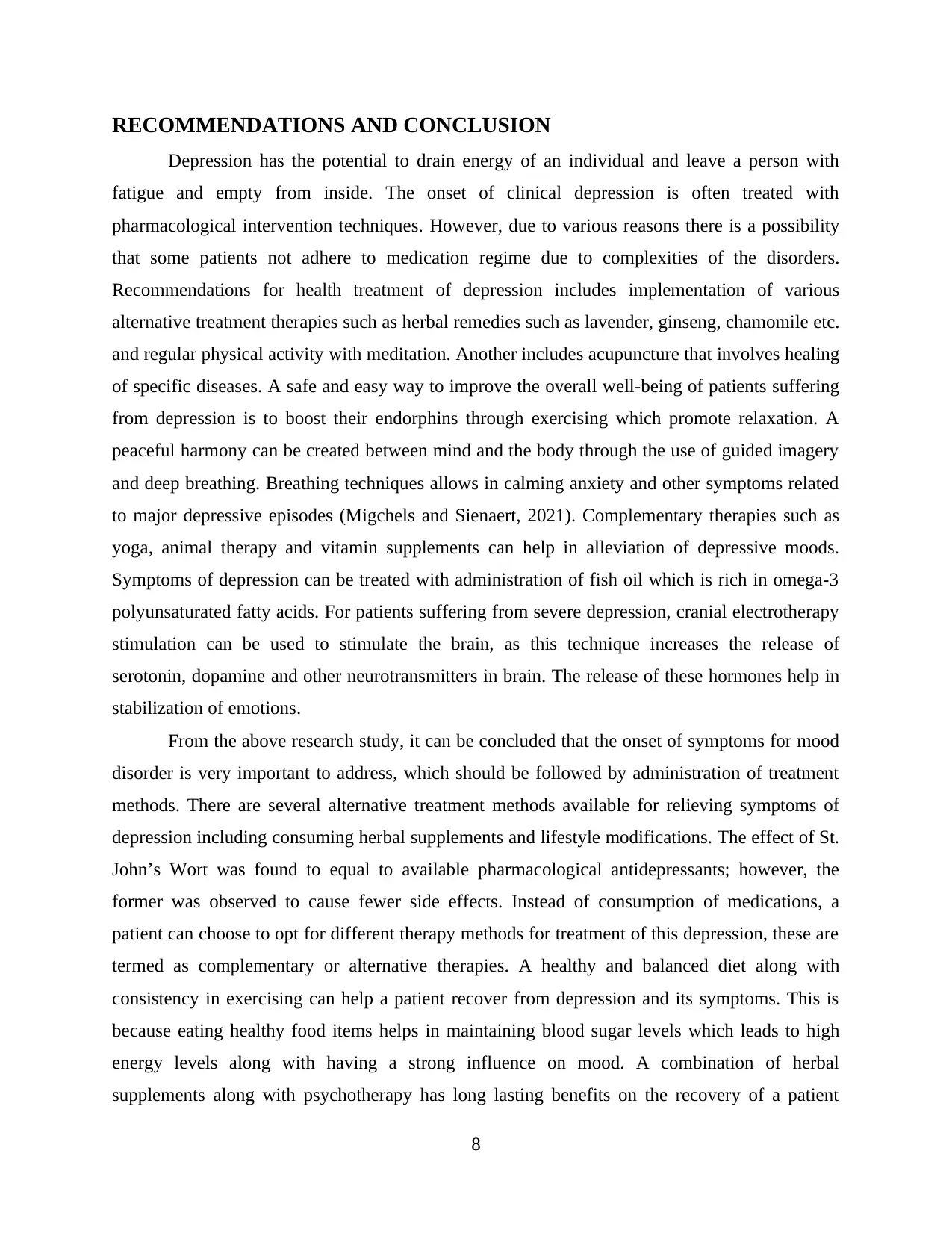
RECOMMENDATIONS AND CONCLUSION
Depression has the potential to drain energy of an individual and leave a person with
fatigue and empty from inside. The onset of clinical depression is often treated with
pharmacological intervention techniques. However, due to various reasons there is a possibility
that some patients not adhere to medication regime due to complexities of the disorders.
Recommendations for health treatment of depression includes implementation of various
alternative treatment therapies such as herbal remedies such as lavender, ginseng, chamomile etc.
and regular physical activity with meditation. Another includes acupuncture that involves healing
of specific diseases. A safe and easy way to improve the overall well-being of patients suffering
from depression is to boost their endorphins through exercising which promote relaxation. A
peaceful harmony can be created between mind and the body through the use of guided imagery
and deep breathing. Breathing techniques allows in calming anxiety and other symptoms related
to major depressive episodes (Migchels and Sienaert, 2021). Complementary therapies such as
yoga, animal therapy and vitamin supplements can help in alleviation of depressive moods.
Symptoms of depression can be treated with administration of fish oil which is rich in omega-3
polyunsaturated fatty acids. For patients suffering from severe depression, cranial electrotherapy
stimulation can be used to stimulate the brain, as this technique increases the release of
serotonin, dopamine and other neurotransmitters in brain. The release of these hormones help in
stabilization of emotions.
From the above research study, it can be concluded that the onset of symptoms for mood
disorder is very important to address, which should be followed by administration of treatment
methods. There are several alternative treatment methods available for relieving symptoms of
depression including consuming herbal supplements and lifestyle modifications. The effect of St.
John’s Wort was found to equal to available pharmacological antidepressants; however, the
former was observed to cause fewer side effects. Instead of consumption of medications, a
patient can choose to opt for different therapy methods for treatment of this depression, these are
termed as complementary or alternative therapies. A healthy and balanced diet along with
consistency in exercising can help a patient recover from depression and its symptoms. This is
because eating healthy food items helps in maintaining blood sugar levels which leads to high
energy levels along with having a strong influence on mood. A combination of herbal
supplements along with psychotherapy has long lasting benefits on the recovery of a patient
8
Depression has the potential to drain energy of an individual and leave a person with
fatigue and empty from inside. The onset of clinical depression is often treated with
pharmacological intervention techniques. However, due to various reasons there is a possibility
that some patients not adhere to medication regime due to complexities of the disorders.
Recommendations for health treatment of depression includes implementation of various
alternative treatment therapies such as herbal remedies such as lavender, ginseng, chamomile etc.
and regular physical activity with meditation. Another includes acupuncture that involves healing
of specific diseases. A safe and easy way to improve the overall well-being of patients suffering
from depression is to boost their endorphins through exercising which promote relaxation. A
peaceful harmony can be created between mind and the body through the use of guided imagery
and deep breathing. Breathing techniques allows in calming anxiety and other symptoms related
to major depressive episodes (Migchels and Sienaert, 2021). Complementary therapies such as
yoga, animal therapy and vitamin supplements can help in alleviation of depressive moods.
Symptoms of depression can be treated with administration of fish oil which is rich in omega-3
polyunsaturated fatty acids. For patients suffering from severe depression, cranial electrotherapy
stimulation can be used to stimulate the brain, as this technique increases the release of
serotonin, dopamine and other neurotransmitters in brain. The release of these hormones help in
stabilization of emotions.
From the above research study, it can be concluded that the onset of symptoms for mood
disorder is very important to address, which should be followed by administration of treatment
methods. There are several alternative treatment methods available for relieving symptoms of
depression including consuming herbal supplements and lifestyle modifications. The effect of St.
John’s Wort was found to equal to available pharmacological antidepressants; however, the
former was observed to cause fewer side effects. Instead of consumption of medications, a
patient can choose to opt for different therapy methods for treatment of this depression, these are
termed as complementary or alternative therapies. A healthy and balanced diet along with
consistency in exercising can help a patient recover from depression and its symptoms. This is
because eating healthy food items helps in maintaining blood sugar levels which leads to high
energy levels along with having a strong influence on mood. A combination of herbal
supplements along with psychotherapy has long lasting benefits on the recovery of a patient
8
Paraphrase This Document
Need a fresh take? Get an instant paraphrase of this document with our AI Paraphraser
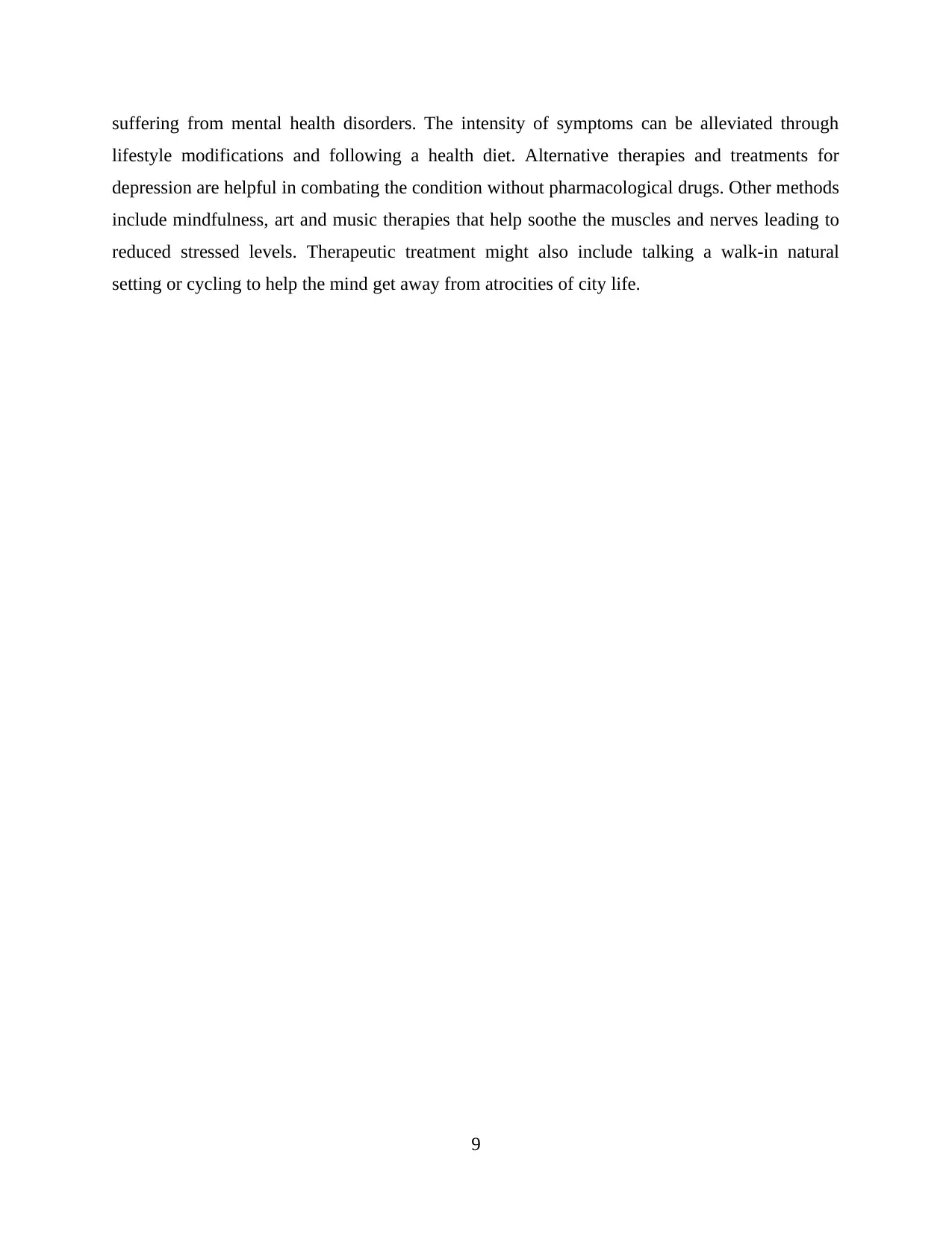
suffering from mental health disorders. The intensity of symptoms can be alleviated through
lifestyle modifications and following a health diet. Alternative therapies and treatments for
depression are helpful in combating the condition without pharmacological drugs. Other methods
include mindfulness, art and music therapies that help soothe the muscles and nerves leading to
reduced stressed levels. Therapeutic treatment might also include talking a walk-in natural
setting or cycling to help the mind get away from atrocities of city life.
9
lifestyle modifications and following a health diet. Alternative therapies and treatments for
depression are helpful in combating the condition without pharmacological drugs. Other methods
include mindfulness, art and music therapies that help soothe the muscles and nerves leading to
reduced stressed levels. Therapeutic treatment might also include talking a walk-in natural
setting or cycling to help the mind get away from atrocities of city life.
9
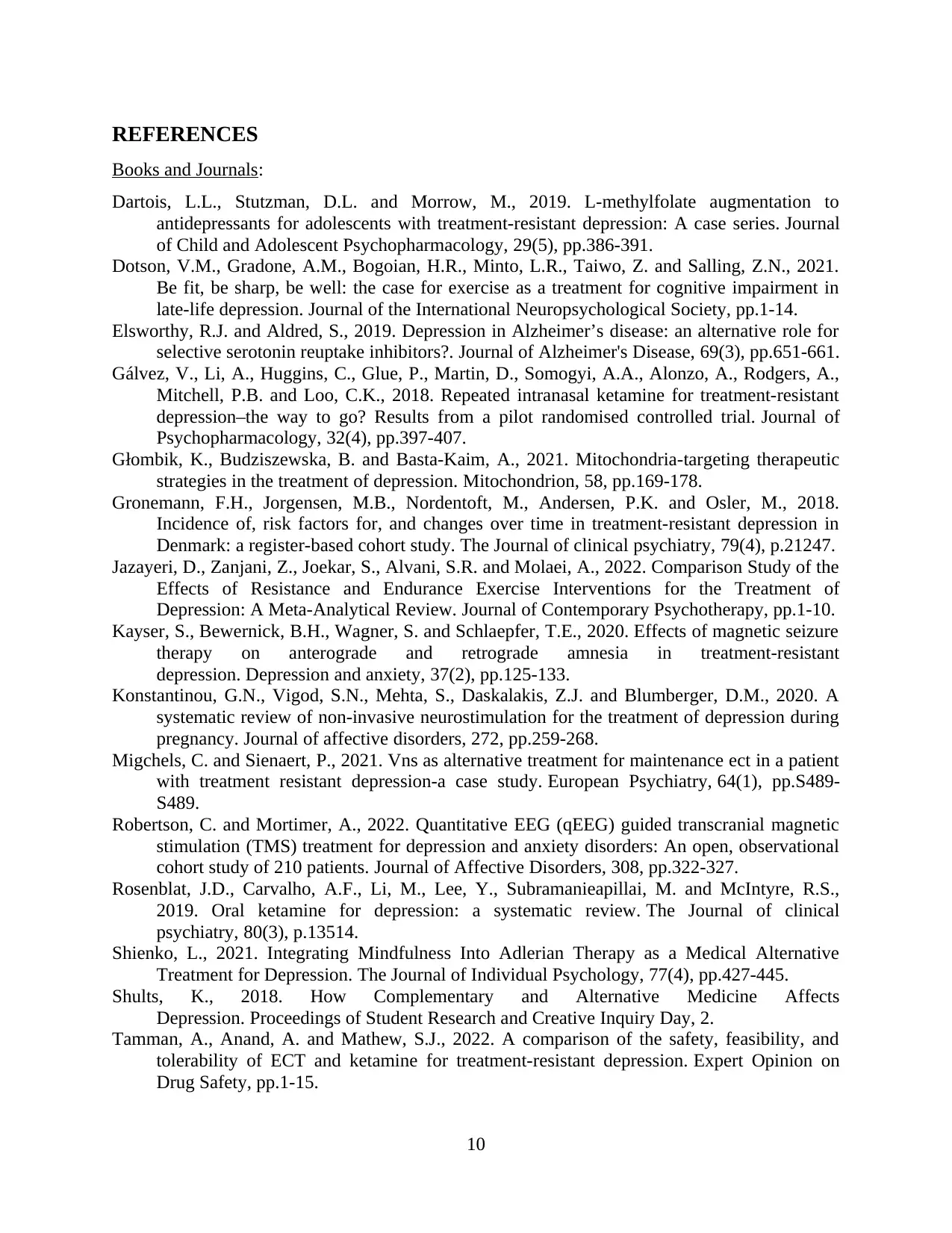
REFERENCES
Books and Journals:
Dartois, L.L., Stutzman, D.L. and Morrow, M., 2019. L-methylfolate augmentation to
antidepressants for adolescents with treatment-resistant depression: A case series. Journal
of Child and Adolescent Psychopharmacology, 29(5), pp.386-391.
Dotson, V.M., Gradone, A.M., Bogoian, H.R., Minto, L.R., Taiwo, Z. and Salling, Z.N., 2021.
Be fit, be sharp, be well: the case for exercise as a treatment for cognitive impairment in
late-life depression. Journal of the International Neuropsychological Society, pp.1-14.
Elsworthy, R.J. and Aldred, S., 2019. Depression in Alzheimer’s disease: an alternative role for
selective serotonin reuptake inhibitors?. Journal of Alzheimer's Disease, 69(3), pp.651-661.
Gálvez, V., Li, A., Huggins, C., Glue, P., Martin, D., Somogyi, A.A., Alonzo, A., Rodgers, A.,
Mitchell, P.B. and Loo, C.K., 2018. Repeated intranasal ketamine for treatment-resistant
depression–the way to go? Results from a pilot randomised controlled trial. Journal of
Psychopharmacology, 32(4), pp.397-407.
Głombik, K., Budziszewska, B. and Basta-Kaim, A., 2021. Mitochondria-targeting therapeutic
strategies in the treatment of depression. Mitochondrion, 58, pp.169-178.
Gronemann, F.H., Jorgensen, M.B., Nordentoft, M., Andersen, P.K. and Osler, M., 2018.
Incidence of, risk factors for, and changes over time in treatment-resistant depression in
Denmark: a register-based cohort study. The Journal of clinical psychiatry, 79(4), p.21247.
Jazayeri, D., Zanjani, Z., Joekar, S., Alvani, S.R. and Molaei, A., 2022. Comparison Study of the
Effects of Resistance and Endurance Exercise Interventions for the Treatment of
Depression: A Meta-Analytical Review. Journal of Contemporary Psychotherapy, pp.1-10.
Kayser, S., Bewernick, B.H., Wagner, S. and Schlaepfer, T.E., 2020. Effects of magnetic seizure
therapy on anterograde and retrograde amnesia in treatment‐resistant
depression. Depression and anxiety, 37(2), pp.125-133.
Konstantinou, G.N., Vigod, S.N., Mehta, S., Daskalakis, Z.J. and Blumberger, D.M., 2020. A
systematic review of non-invasive neurostimulation for the treatment of depression during
pregnancy. Journal of affective disorders, 272, pp.259-268.
Migchels, C. and Sienaert, P., 2021. Vns as alternative treatment for maintenance ect in a patient
with treatment resistant depression-a case study. European Psychiatry, 64(1), pp.S489-
S489.
Robertson, C. and Mortimer, A., 2022. Quantitative EEG (qEEG) guided transcranial magnetic
stimulation (TMS) treatment for depression and anxiety disorders: An open, observational
cohort study of 210 patients. Journal of Affective Disorders, 308, pp.322-327.
Rosenblat, J.D., Carvalho, A.F., Li, M., Lee, Y., Subramanieapillai, M. and McIntyre, R.S.,
2019. Oral ketamine for depression: a systematic review. The Journal of clinical
psychiatry, 80(3), p.13514.
Shienko, L., 2021. Integrating Mindfulness Into Adlerian Therapy as a Medical Alternative
Treatment for Depression. The Journal of Individual Psychology, 77(4), pp.427-445.
Shults, K., 2018. How Complementary and Alternative Medicine Affects
Depression. Proceedings of Student Research and Creative Inquiry Day, 2.
Tamman, A., Anand, A. and Mathew, S.J., 2022. A comparison of the safety, feasibility, and
tolerability of ECT and ketamine for treatment-resistant depression. Expert Opinion on
Drug Safety, pp.1-15.
10
Books and Journals:
Dartois, L.L., Stutzman, D.L. and Morrow, M., 2019. L-methylfolate augmentation to
antidepressants for adolescents with treatment-resistant depression: A case series. Journal
of Child and Adolescent Psychopharmacology, 29(5), pp.386-391.
Dotson, V.M., Gradone, A.M., Bogoian, H.R., Minto, L.R., Taiwo, Z. and Salling, Z.N., 2021.
Be fit, be sharp, be well: the case for exercise as a treatment for cognitive impairment in
late-life depression. Journal of the International Neuropsychological Society, pp.1-14.
Elsworthy, R.J. and Aldred, S., 2019. Depression in Alzheimer’s disease: an alternative role for
selective serotonin reuptake inhibitors?. Journal of Alzheimer's Disease, 69(3), pp.651-661.
Gálvez, V., Li, A., Huggins, C., Glue, P., Martin, D., Somogyi, A.A., Alonzo, A., Rodgers, A.,
Mitchell, P.B. and Loo, C.K., 2018. Repeated intranasal ketamine for treatment-resistant
depression–the way to go? Results from a pilot randomised controlled trial. Journal of
Psychopharmacology, 32(4), pp.397-407.
Głombik, K., Budziszewska, B. and Basta-Kaim, A., 2021. Mitochondria-targeting therapeutic
strategies in the treatment of depression. Mitochondrion, 58, pp.169-178.
Gronemann, F.H., Jorgensen, M.B., Nordentoft, M., Andersen, P.K. and Osler, M., 2018.
Incidence of, risk factors for, and changes over time in treatment-resistant depression in
Denmark: a register-based cohort study. The Journal of clinical psychiatry, 79(4), p.21247.
Jazayeri, D., Zanjani, Z., Joekar, S., Alvani, S.R. and Molaei, A., 2022. Comparison Study of the
Effects of Resistance and Endurance Exercise Interventions for the Treatment of
Depression: A Meta-Analytical Review. Journal of Contemporary Psychotherapy, pp.1-10.
Kayser, S., Bewernick, B.H., Wagner, S. and Schlaepfer, T.E., 2020. Effects of magnetic seizure
therapy on anterograde and retrograde amnesia in treatment‐resistant
depression. Depression and anxiety, 37(2), pp.125-133.
Konstantinou, G.N., Vigod, S.N., Mehta, S., Daskalakis, Z.J. and Blumberger, D.M., 2020. A
systematic review of non-invasive neurostimulation for the treatment of depression during
pregnancy. Journal of affective disorders, 272, pp.259-268.
Migchels, C. and Sienaert, P., 2021. Vns as alternative treatment for maintenance ect in a patient
with treatment resistant depression-a case study. European Psychiatry, 64(1), pp.S489-
S489.
Robertson, C. and Mortimer, A., 2022. Quantitative EEG (qEEG) guided transcranial magnetic
stimulation (TMS) treatment for depression and anxiety disorders: An open, observational
cohort study of 210 patients. Journal of Affective Disorders, 308, pp.322-327.
Rosenblat, J.D., Carvalho, A.F., Li, M., Lee, Y., Subramanieapillai, M. and McIntyre, R.S.,
2019. Oral ketamine for depression: a systematic review. The Journal of clinical
psychiatry, 80(3), p.13514.
Shienko, L., 2021. Integrating Mindfulness Into Adlerian Therapy as a Medical Alternative
Treatment for Depression. The Journal of Individual Psychology, 77(4), pp.427-445.
Shults, K., 2018. How Complementary and Alternative Medicine Affects
Depression. Proceedings of Student Research and Creative Inquiry Day, 2.
Tamman, A., Anand, A. and Mathew, S.J., 2022. A comparison of the safety, feasibility, and
tolerability of ECT and ketamine for treatment-resistant depression. Expert Opinion on
Drug Safety, pp.1-15.
10
⊘ This is a preview!⊘
Do you want full access?
Subscribe today to unlock all pages.

Trusted by 1+ million students worldwide
1 out of 13
Related Documents
Your All-in-One AI-Powered Toolkit for Academic Success.
+13062052269
info@desklib.com
Available 24*7 on WhatsApp / Email
![[object Object]](/_next/static/media/star-bottom.7253800d.svg)
Unlock your academic potential
Copyright © 2020–2025 A2Z Services. All Rights Reserved. Developed and managed by ZUCOL.





